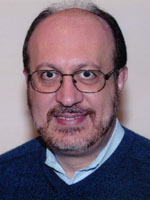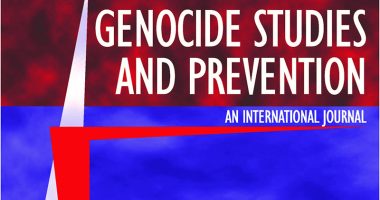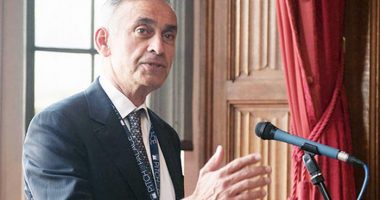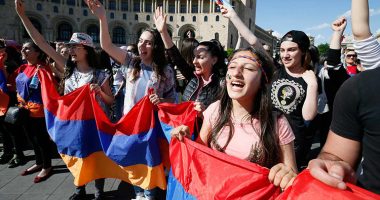Following is the text of remarks delivered by Dr. Joseph Kéchichian, Editor of the Journal of the Society for Armenian Students, during a panel discussion, organized by AGBU Young Professionals of Los Angeles (YPLA), entitled: The Armenian Diaspora at a Crossroads – 21st Century Challenges..
As I only have a few minutes upfront, let me answer our moderator’s question: Have we already reached the point where the Homeland and Diaspora have mutually exclusive agendas that can no longer be reconciled?
The answer is, yes we have, which means that we are now one nation but two distinct peoples, one state as well as a multitude of Diasporas. The estimated 10 million Armenians worldwide are divided into 2 million in Armenia proper, and nearly 8 million everywhere else, with large communities in Russia, the United States, France, Argentina, Brazil, Canada, Lebanon, Syria and Iran.
Since the 1991 Independence of the Republic of Armenia, various efforts have been made to improve relations across the board, but these have failed. The latest offer, made by Diaspora Affairs Minister Hranush Hakopyan, is to allow Diaspora members to serve in the proposed Senate. Since no one knows whether 8 million Armenians may be allocated 1 or 100 seats, one must remain cautious about any such proposal, for fear of disappointment.
In the meantime, one must ask, along with Ani Navasardyan, WHY DO SO MANY ARMENIANS ARE LEAVING ARMENIA? According to her report, published online on the Civilitas Foundation web page in January 2011, “fifty seven percent of Armenians want to temporarily leave Armenia, while this number is 45% in Georgia and 47% in Azerbaijan for their respective populations.” Even worse, “twenty five percent of Armenians want to permanently leave Armenia, while this number is 11% and 16% for Georgia and Azerbaijan, respectively.” In other words, more people want to leave than go there, which brings me to the heart of my comment.
Until the date when Armenia becomes an attractive destination to settle in, and this should be our ultimate goal if we are to survive as a modernizing nation with a role in world civilization, it seems more logical to strengthen ourselves in the Diaspora.
How can we do this? I have 5 short suggestions:
The Diaspora needs to organize into a global political organization, with open elections (virtual or mechanical) to selectùnot appointùa new generation of leaders who will speak for their constituents; and interface with their counterparts in Yerevan.Such a maturation process will avoid undue sensitivities like the ones that surfaced during the Armenia-Turkey Protocols debate. Both sides would benefit from such a mechanism, with Republic officials engaging Diasporan leaders on concerns that affect the entire Armenian nation.
How to elect a Diaspora-wide leadership is tricky even if we muster logistical hurdles. What should we call such elected men and women, who will pay their salaries, and what types of immunity will they enjoy? Do we pay to vote (let’s say $100 per person, which would net $100 million if 1 million Armenians participated in such an exercise)? I know some are saying that vote-buying might occur but that’s the price of democracy. Always remember what Plato used to say about democracy: “a charming form of government, full of variety and disorder, and dispensing a sort of equality to equals and unequals alike.” In the event, what we need to create is a brand new relationship, which will emerge between the Republic of Armenia (ROA) and the Armenian Congress (AC). Moreover, as bilingualism dissipates in the Diaspora, it is equally important to agree on common languages to communicate among ourselves, as well as with Armenia. Towards that end, the very idea of teaching Republic residents foreign languages, other than Russian, might be recommended. Anyway, you can appreciate the hurdles, but we must start somewhere.
Of course, the greater challenge, something that Yerevan learned to manipulate well, is to avoid various splits within Diaspora Armenians. We have legacy organizations, 4 Churches, a slew of non-governmental organizations, all of which can either add to the cacophony of democracy or become the harbinger of plurality. Needless to say that I strongly believe the time has come to start from scratch, establish organizations that will make genuine contributions rather than import stale and now largely pass? ideologies. We need to produce a new vision by tapping talent wherever we may find it, share our analyses with as many as possible, and persuade most to stand by the AC. The point here is not to simply create a new organization but to establish an umbrella group that will be inclusive, capable and, more important, open to a variety of opinions. This is going to be quite messy during a number of years but it is not impossible if we have a few dictated leaders willing to be inclusive.
The AC, therefore, might be seen as a supra-national group, staffed by an educated elite with real expertise, capable of harnessing global talent to best advice the nation as well as the Republic. In the case of the latter, such advice ought to be presented if and only if Yerevan requests itùespecially before signing international agreements or reaching decisions that may affect the nation as a whole. This is, of course, wishful thinking on my part, because I am increasingly persuaded that ROA officials have absconded the right to speak on behalf of the entire nation. The AC’s greatest challenge, nay, let’s be honest and call it what it will become, the AC’s greatest threat, is to be able to stand up to Yerevan.
The Republic of Armenia experiment with the Diaspora Ministry to date has been a mixed blessing. Although a useful institution for Yerevan, the ministry naturally promotes and protectes Armenia’s interests, not those of the Diaspora. Admittedly, it is a young and largely underfunded ministry, and while the Minister is an affable individual, her ability to act as a go-between or act as a bridge between the Republic and the Nation have yet to be fulfilled. The Ministry needs to have a strong interlocutor and it may just have that in the AC when one is created.
You noticed that I did not utter a specific word: Genocide. This is not because I do not consider recognition of the Armenian Holocaust important. Incidentally, and like Robert Fisk, who still likes Armenians although we fail to appreciate his immense contributions to our nation, I prefer to use ôArmenian Holocaustö because the very term ôGenocideö is difficult to comprehend or absorb. Holocaust is a test and well-oiled concept and it is time we apply it to our case without fear or apprehension. The day of our parents should not be classified under a technical terminology. But I digress, while I certainly consider this topic critical, its recognition is a matter that needs to be addressed by the AC while we address equally important topics like state-building, human rights concerns, freedoms and liberties, cultural relevance or, God forbid, cultural irrelevance, assimilation, inter-marriage, economic strengths, etcà, all of which concern us in the Diaspora. We need to understand, accept the need for, prepare in earnest, and organize our affairs in the best and most efficient methods possible. To those who say that these concerns ought to be handled by Republic of Armenia officials, one can only agree, and repeat that while Yerevan will look after its own interests, we in the Diaspora should do likewise. To paraphrase the great Swiss writer Jean Jacques Rousseau, who called for a popular mobilization when he declared “As soon as any man says of the affairs of the State, ‘What does it matter to me?,’ the State may be given up for lost,” perhaps we ought to claim: “As soon as any Armenian living outside of the Republic says of the affairs of the Diaspora, ‘What does it matter to me?,’ the Diaspora may be given up for lost.” Let’s start to think about how to mobilize, organize, and plan for our futures even if we are condemned to temporarily live in away from the motherland while the Republic matures, adopts inclusive policies, and accepts us with open arms.











